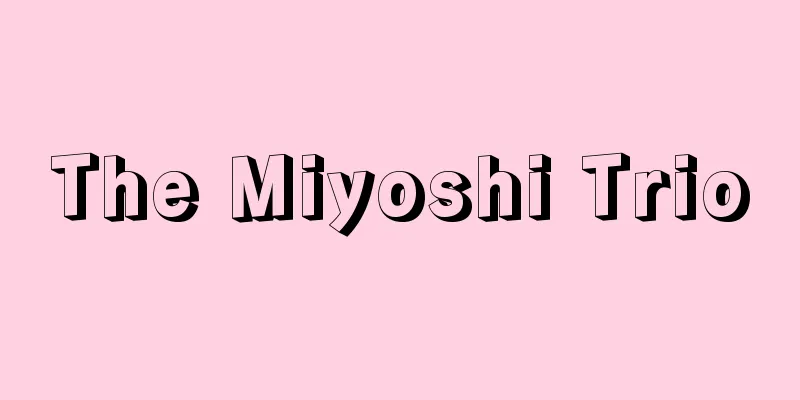Husband and wife - Husband and wife

|
The word fuufu, along with "meoto," is a Japanese word that refers to a married man and woman. [Akira Sasaki] The Concept of Marriage in Modern SocietyIt is an important concept in Japan, as seen in Chinese folk tales about the "fate of a married couple" of the "predestined wife" type found in various places. The reason why the modern Japanese concept of "couple" is normative in modern society is probably because, until relatively recently, unmarried men and women were restricted from acting together in Japan, and men and women who acted together were almost always married "couples". In modern civil society, where restrictions on unmarried men and women acting together were relaxed early on, there are many opportunities for men and women to act together, regardless of whether they are married or unmarried, and words that refer to men and women acting together (such as the English word "couple") are important, in contrast to the concept of words that refer to married men and women, which is not as important as in Japanese. The extent to which a couple's actions should be made public to third parties varies by culture, but in societies that emphasize pre-modern traditions, the scope of disclosure of a couple's actions is generally narrower than in modern societies. In modern society, problems related to couples have become more specialized and intensified due to conditions unique to modern society. The most important condition is the development of medical care. In premodern societies, maternal mortality was high, and the death of a young wife often led to a new couple's pairing. However, modern medical care has reduced perinatal mortality rates, and the probability of the same pairing continuing even after children have been born has increased. In addition, the number of years between the time a couple has had children and the death of one of them, and the number of years between the time a child reaches adulthood and the death of one of an elderly couple, has increased. As a result, the time spent alone as a couple, which was once virtually limited to the newlywed period, has expanded several dozen times, taking up a large part of a couple's lives, and various problems have begun to be considered. In middle-class families in the process of modernization, life expectancy has begun to increase, but there has also been an emphasis on women's involvement in housework. In addition, there has been a difficulty in obtaining housing, and it is common for two generations of couples to live in one household, which tends to create problems such as "daughter-in-law and mother-in-law problems." In addition, the rapid population growth during modernization meant that the number of younger women who could become wives far outnumbered the number of older men who could become husbands, weakening the negotiating power of wives and making it easy for the power balance between husband and wife to become unbalanced. During Japan's modernization process, the weak position of wives was further weakened by the Confucian idea of division of labor that "there should be separate roles for husband and wife," so unnatural social relations surrounding husband and wife were prone to become problems, but as modernization progresses, attention is shifting to the long-term maintenance of the marital relationship itself. [Akira Sasaki] Legally married coupleA husband and wife are the closest of all human ties, and in modern family law, they are considered to be the core of the family. Because of this closeness, husband and wife are considered to be one body, and are often treated differently from other human relationships. However, on the other hand, if the oneness of a husband and wife is overemphasized, there is a risk that one of the spouses (usually the wife) will become immersed in the oneness and lose their independence. When considering the legal relationship of a husband and wife, a major issue is how to reconcile the two demands of the oneness of a husband and wife and the independence of the individual. (1) A husband and wife shall have the same surname (family name) to show that they are one (Article 750 of the Civil Code). A husband and wife shall be recognized as a formal married couple only by filing a marriage registration (if a registration is not filed, they shall be considered to be in a common-law marriage), and the wife who takes the husband's surname shall be registered in the husband's family register, and the husband who takes the wife's surname shall be registered in the wife's family register (Article 16 of the Family Registration Law). The couple shall decide which surname to use. However, there has been criticism of this forced marriage. In reality, the wife overwhelmingly changes her surname to that of her husband, so this effectively results in the wife being forced to change her surname upon marriage. In 1996, the Legislative Council proposed a so-called selective separate surnames system, which would allow married couples to have different surnames, but due to opposition within the Diet, the proposal was shelved (see "Various Issues Related to Married Couples" below for details). (2) Spouses have the obligation to live together, cooperate, and support each other (Civil Code Article 752). This is a natural obligation derived from the oneness of husband and wife. However, in cases of refusal to live together without reason, a judgment can be obtained, but there is no way to enforce it. Financially, too, it is assumed that a couple will live together harmoniously, and the expenses necessary for marital life are to be shared, taking into consideration each person's assets, income, and all other circumstances. (3) In Japan's statutory marital property system, the independence of spouses is emphasized, and separate property is adopted. In other words, all property owned by spouses before marriage, property acquired by each spouse through inheritance or gift after marriage, as well as property acquired through work, are considered to be the individual property of each spouse, and only a small amount of property that is unclear as belonging to either spouse is presumed to be jointly owned. Spouses have complete rights to manage and profit from their own property. At first glance, this system in Japan seems to be a very fair system, in which the ownership and management of each spouse's property is completely independent. However, under this system, if the husband works outside the home and earns an income, and the wife only engages in housework, the wife has no rights to the property purchased with the husband's income, and the problem is the substantial inequality hidden behind the independence of spouses. The systems of inheritance when the husband dies and division of property in case of divorce are considered to embody the wife's potential rights to what is nominally the husband's property. Regarding inheritance, the 1980 amendment to the Civil Code expanded the wife's share of inheritance, but when it comes to dividing property upon divorce, a difficult issue is how to evaluate the degree of a wife's contribution to her husband's property. The outline of the Civil Code amendment proposed by the Legislative Council in 1996 states that unless there are special circumstances, each should receive half of the property. In principle, if one spouse incurs debts to a third party, the other spouse is not liable, but for debts incurred by one spouse for daily housework, the other spouse is jointly liable in order to protect third parties (Civil Code Article 761). [Yasuyuki Takahashi and Masamitsu Nozawa] Sociological View of MarriageA husband and wife is a word that describes the bond between a man and a woman that is formed through marriage. Even today, when unmarried men and women are free to form bonds and engage in joint activities, it is still clearly distinguished from the bond and joint activities of a husband and wife. The degree to which a husband and wife's bond should be made public to third parties varies by era and culture, but in today's modern society, there is no obligation to make it widely public. A husband and wife are originally a contractual relationship. However, this union is not a commercial contractual relationship in which one uses the other as a means to achieve some personal goal. The relationship between husband and wife is not a means to either party, but an end in itself, that is, a relationship in which each spouse is irreplaceable. In that sense, the relationship between husband and wife is a unique relationship that is different from other unions. The relationship between husband and wife is the core of family relationships, and they share roles that are essential to maintaining family life. This is the so-called gender role division of husband and wife, and while there are some parts of the division of roles related to reproduction, childbirth, and breastfeeding behavior based on biological sex differences that cannot be changed between husband and wife, the division of roles between men and women that is socially and culturally determined can be changed depending on changes in norms and situations, and on the living conditions or family lifestyle of the family group, and varies from couple to couple. Power relations between couples are classified into husband-dominant, wife-dominant, and equal, depending on the relative strength of the couple's voice and negotiating power to achieve the intended results. The equal type is further classified into cooperative and autonomous. In contrast to the majority of American couples, Japanese couples were once believed to be husband-dominant, but it has been found that in fact there are many autonomous couples, in which the spheres in which the husband and the wife have power are separate. However, in recent years, a gradual shift toward cooperative couples is also being observed. [Hisaya Nonoyama] Marital issuesThe legal relationship between husband and wife emphasizes the unity of the couple, with the couple obligated to live together and to have the same surname. However, the emphasis on the unity of the couple is also a vestige of the traditions of the former "ie" system (old family system), and since more than 97% of wives today change their surname to their husband's when they marry, the obligation to change surname is often perceived as being imposed on the wife. In particular, there is a tendency for the husband's relatives to expect the new wife to take on the role of a "bride" who serves the husband's parents by changing her surname. Many developed countries have already institutionalized the option of separate surnames for married couples. In Japan, too, the Civil Code Division's Personal Status Law Subcommittee of the Legislative Council, an advisory body to the Minister of Justice, began considering legal reform in January 1991, and in February 1996 compiled an outline of Civil Code reform that included a system of optional separate surnames for married couples. The emphasis on marital unity cannot come at the expense of the wife's autonomy, but rather the autonomy of both husband and wife must be protected and nurtured. If this is the case, then the primary issue in marital relationships is the autonomy of husband and wife, rather than marital unity. The institutionalization of optional separate surnames for married couples is simply one of the prerequisites for this. Until now, it was often taken for granted that the wife's autonomy would be sacrificed as an extension of the emphasis on marital unity. This has given rise to various problems between couples. Marital violence (domestic violence) is one of them. Marital violence is violence by the husband against the wife (for example, hitting, kicking, shoving, throwing things at her, etc.). In severe cases, the wife may suffer bone breaks, injuries, bruises, etc. Until now, violence by the husband against the wife has been considered an internal dispute between the husband and wife, and legal intervention has been restrained in principle. As a result, the actual situation has remained unclear. In 1996, the government formulated the "2000 Plan for Gender Equality," making the eradication of violence against women one of its key goals, and has just begun administrative efforts to address this issue. Furthermore, due to the increase in average life expectancy of both spouses, the number of years between the time they finish raising their children and the death of one of them has become much longer, and with the decline in three-generational family structures, the amount of time the couple spends alone together, often referred to as the second honeymoon period, has expanded significantly. However, while the second honeymoon period is a happy time spent together as a married couple, couples who have not been able to nurture their love for each other through child-rearing are forced to confront the true nature of their marital relationship. The rising divorce rate among middle-aged and elderly couples today reveals the reality that the long second honeymoon period cannot be described as simply a happy one for couples. [Hisaya Nonoyama] [Reference items] | | | | | | | | | | | | |Source: Shogakukan Encyclopedia Nipponica About Encyclopedia Nipponica Information | Legend |
|
夫婦は「めおと」などとともに結婚した男女をさす日本語である。 [佐々木明] 近代社会の夫婦概念中国にもある「定められた女房」型の「夫婦の因縁」民話が各地にみられるなど、日本では重要な概念である。近代日本語の「夫婦」概念が近代社会としては規範的であるのは、日本では比較的近年まで未婚の男女2人の共同行動が抑制され、2人で行動する男女がもっぱら既婚の「夫婦」であったことに起因するのだろう。未婚男女の共同行動への抑制を早くから緩和した近代市民社会では、未婚・既婚を問わず男女が2人で行動する機会が多く、ともに行動する男女をさす語(英語のcoupleなど)が重要であり、既婚の男女をさす語の概念が日本語に比べれば重要でないのと対照的である。夫婦の行動を第三者に公表すべき範囲は文化により異なるが、近代社会などに比べて前近代的伝統を強調する社会では夫婦の行動の公表範囲がおおむね狭い。 近代社会では夫婦に関する諸問題が、近代社会固有の諸条件により、特殊化、強化された。もっとも重要な条件は医療の発達である。前近代社会では妊産婦死亡が多く、若い妻の死亡が夫婦の組合せを更新する機会が多かったが、近代医療が周産期死亡率を下げると、子供を生み終えた後にも同じ組合せが続く確率が高まった。これに加えて、子供を生み終えてから夫婦の一方が死亡するまでの年数、さらに子供が成人してから老夫婦の一方が死亡するまでの年数が延長して、かつては事実上新婚時代に限られていた夫婦だけで過ごす期間が数十倍に拡大し、人生の大部分を占める事態が生じ、さまざまな問題が意識され始めた。近代化途上の中産階級家庭では、寿命が延び始める一方で、女性の家事従事が強調され、さらに住宅入手の困難も加わり、1世帯に2世代の夫婦が住むことが多く「嫁・姑(しゅうとめ)問題」などが生じやすい傾向が一般に認められる。また、近代化途上の人口急増により、妻になりうる年下の女性の数が夫となるべき年上の男性の数を大きく上回るので、妻の交渉力が弱まり、夫婦の力関係が不均衡になりやすい。日本の近代化過程では、妻の弱い立場を「夫婦別あり」とする儒教的分業思想がさらに弱めたので、夫婦をめぐる不自然な社会関係が問題になりやすかったが、近代化進行とともに夫婦の関係自体の長期的維持に関心が移行しつつある。 [佐々木明] 法律上の夫婦夫婦は、人と人との結び付きのなかで、もっとも緊密なものであり、現代社会における家族法では、家族の核をなすものとしてとらえられている。その緊密性のゆえに夫婦は一体であるものとし、他の人間同士の場合とは異なった取扱いを受けることが多い。しかし、他方、夫婦の一体性を強調しすぎると、夫婦のいずれかが(多くの場合は妻が)一体性のなかに埋没し、独立性を喪失するおそれがある。夫婦の法律関係を考える場合には、この夫婦の一体性と個人の独立性の二つの要請をどのように調和させるかが大きな問題である。 (1)夫婦は一体であることを示すために同じ氏(うじ)(姓)を名のる(民法750条)。また、夫婦は婚姻届を出すことによってはじめて法律上正式な夫婦と認められ(届けを出さない場合は内縁関係とみなされる)、夫の氏を称する妻は夫の戸籍に入り、妻の氏を称する夫は妻の戸籍に入る(戸籍法16条)。夫婦のどちらの氏にするかは当事者の相談によって決める。しかし、この夫婦同氏(夫婦同姓)の強制については批判も出ている。実際には妻が夫の氏に変わることが圧倒的に多いので、事実上、妻が婚姻によって氏を変えることを強制される結果になるからである。なお、1996年(平成8)に法制審議会は、夫婦は別姓を名のることができるとする、いわゆる選択的夫婦別姓制度を提案したが、国会内部の反対の声におされて、上程が見送られた(詳細は後述「夫婦に関する諸問題」参照)。 (2)夫婦は、同居、協力、扶助の義務を負う(民法752条)。夫婦の一体性から派生する当然の義務である。もっとも、理由のない同居拒絶に対しては、判決はもらえるが強制の方法はない。経済的にも、夫婦は円満な共同生活を営むことが前提であり、夫婦生活に必要な費用は、それぞれの資産・収入その他いっさいの事情を考慮して、分担することになっている。 (3)日本の法定夫婦財産制では、夫婦の独立性が強調されて、別産制がとられている。すなわち、夫婦が婚姻前からもっていた財産や、それぞれが婚姻後に相続や贈与で得た財産はもちろんのこと、働いて得た財産もすべて、その者の特有財産とされ、わずかに夫婦のいずれに属するか明らかでない財産だけが共有と推定されるにとどまる。そして、夫婦は自己の財産については、完全な管理・収益の権能をもつ。日本のこの制度は、夫婦それぞれの財産の所有と管理をまったく独立なものとする、一見きわめて公平な制度であるようにみえる。しかし、この制度のもとでは、夫が外で働き収入を得、妻は家事にのみ従事する場合には、妻は、夫の収入で購入した財産になんの権利ももたないこととなり、夫婦の独立性の陰にかくれた実質的な不平等が問題となる。夫が死んだ場合の相続や、離婚の場合の財産分与の制度は、名目上夫の財産となっているものに対する妻の潜在的権利を具体化するものだとされている。相続については、1980年(昭和55)の民法改正で妻の相続分が拡大されたが、離婚の際の財産分与については、夫の財産に対する妻の寄与の程度をどのように評価するかが困難な問題となる。1996年(平成8)に法制審議会が提案した民法改正案要綱では、特別な事情がない限り、半分ずつと考えるべきだとしている。なお、夫婦の一方が第三者に対して債務を負った場合に、他方は責任を負わないのが原則であるが、日常の家事のために一方が負った債務については、第三者を保護するため、他方も連帯債務を負う(民法761条)。 [高橋康之・野澤正充] 社会学からみた夫婦夫婦とは、結婚によって形成された男と女の結合関係を表すことばである。未婚の男女の結合関係や共同行動が自由になり、盛んになった今日でも、それと夫婦の結合関係や共同行動とは明確に区別される。夫婦の結合は、それが第三者にどの程度公表されるべきかについては時代や文化によって異なるが、今日の近代社会では広範囲な公表の義務はない。 夫婦はもともとは契約上の関係である。しかしその結合は、他者を利用してなんらかの個人的目的を達成するための手段とみなすような営利的な契約関係ではない。夫婦の関係は、その結合関係がそれぞれにとって手段ではなく、それ自体が目的である関係、すなわち夫婦は互いに余人をもってかえがたき関係である。その意味において夫婦の関係は、その他の結合関係と異なる固有の関係である。 夫婦の関係は家族関係の中核となる関係にあり、家族生活を維持するために不可欠な役割分担を行う。それはいわゆる夫婦の性別役割分業であるが、生物学的性差に基づく生殖・出産・授乳行動に関する役割分担には夫婦間で交代不可能な部分もあるが、社会的、文化的に規定された男女間の役割分担は、規範や状況の変化に応じて、また家族集団の生活状況あるいは家族ライフスタイルに応じて交代可能であり、個々の夫婦によって多様である。 夫婦間の勢力関係は、夫婦間での発言力や意図した結果を導くための交渉力の相対的大きさによって夫優位型、妻優位型、および夫婦対等型に分類される。夫婦対等型は、さらに夫婦協力型と夫婦自律型とに分類される。夫婦協力型の多いアメリカの夫婦に対して、日本では、かつては夫優位型と信じられてきていたが、実は夫が勢力を有する領域と妻が勢力を有する領域とが分離している夫婦自律型の多いことがみいだされてきた。しかし昨今では、夫婦協力型への変化も徐々にみいだされるようになってきている。 [野々山久也] 夫婦に関する諸問題法律上での夫婦の関係は、夫婦が同居の義務を負っていることや、夫婦が同一の姓を名のることが強制されているなど、夫婦の一体性が強調されている。しかし夫婦の一体性の強調は、かつての「家」制度(旧家族制度)の伝統の名残(なごり)もあって、今日97%以上の妻が結婚時に夫の姓に変えていることから、往々にして改姓の義務は妻に課せられているかのように理解されがちである。とくに夫側の親族は、姓の変更をもって新妻が夫の父母に仕える「嫁」としての役割を担うことを期待する傾向がみいだされる。 すでに多くの先進国では選択的夫婦別姓が制度化されている。日本でも1991年(平成3)1月から法務大臣の諮問機関である法制審議会の民法部会身分法小委員会において法改正の検討が開始され、1996年2月に選択的夫婦別姓制を盛り込んだ民法改正要綱をまとめている。夫婦の一体性の強調が妻の自律性の犠牲のうえに成り立つのではなく、夫と妻のそれぞれの自律性が保護されながら育まれなければならない。となれば夫婦の一体性よりも、まず夫と妻の自律性こそが夫婦の関係の第一の課題である。選択的夫婦別姓の制度化は、その前提の一つにほかならない。 これまでは、夫婦の一体性の強調の延長から妻の自律性が犠牲にされることが当然視されがちであった。そのことから夫婦間のさまざまな問題も生じてきた。夫婦間暴力(DV=ドメスティック・バイオレンス)もその一つである。夫婦間暴力は、男性である夫からの女性である妻への暴力(たとえば、殴る、蹴(け)る、突き飛ばす、物をぶつける、など)である。ひどい場合には、骨を折ったり、傷を負ったり、あざができたり、等々の被害を受ける。夫からの妻への暴力は、これまでは夫婦の内輪喧嘩(うちわげんか)とみなされ、原則的に法的介入は抑制されてきた。その分、その実態は不明確のままであった。1996年に国は「男女共同参画2000年プラン」を策定し、女性に対する暴力の根絶を重点目標の一つにし、行政的な取組みを開始したところである。 なお今日の夫婦は、互いの平均寿命の伸長によって子育てを終えてから夫婦のいずれかの一方が死亡するまでの年数が非常に長くなり、また3世代同居の家族形態の減少も加わって、第二の新婚期ともいわれる夫婦だけで過ごす期間が大幅に拡大している。しかし第二の新婚期とは、幸せな夫婦生活である一方で、子育てを通して夫婦の愛情を育んでこられなかった夫婦には2人だけの時間が多くなるだけに、改めて夫婦関係の本質に直面せざるをえなくなる。今日における中高年夫婦の離婚率の上昇は、長期の第二の新婚期が夫婦にとって幸せとのみいいきれない現実を明らかにしている。 [野々山久也] [参照項目] | | | | | | | | | | | | | |出典 小学館 日本大百科全書(ニッポニカ)日本大百科全書(ニッポニカ)について 情報 | 凡例 |
Recommend
John Dudley, Duke of Northumberland
1502?‐53 English soldier. In 1538 he became Lieute...
Zenmui
A monk translator from India. His Sanskrit name i...
Whipple, FL
…The comet's nucleus, the main body of the co...
Kasri Shirin (English spelling)
…The front part of the building is a public area ...
Standard scale - hyojunjyaku (English spelling) standard scale
They are more accurate than metal rulers and are u...
Kisumu - Kisumu (English spelling)
A port city in western Kenya, east Africa. The ca...
Viola thibaudieri (English spelling) Viola thibaudieri
… [Yukio Taniguchi]. … *Some of the terminology t...
Onigesi - Onigesi
A perennial plant of the Papaveraceae (APG classi...
Kaihosha
...It is the birthplace of Daisaku Soma, the mast...
《Karin Bokusoku》 - Karin Bokusoku
…Other dictionaries that were newly introduced fr...
Ocean Acoustic Tomography
…The time required for each path is determined by...
Soka [city] - I see
A city in southeastern Saitama Prefecture. Establi...
Archaic
…It is between the Paleo-Indian and Woodland cult...
McLeod gauge
...From atmospheric pressure to roughly 10 2 Pa (...
nuptial plumage
…In birds, the males often wear very flamboyant f...









